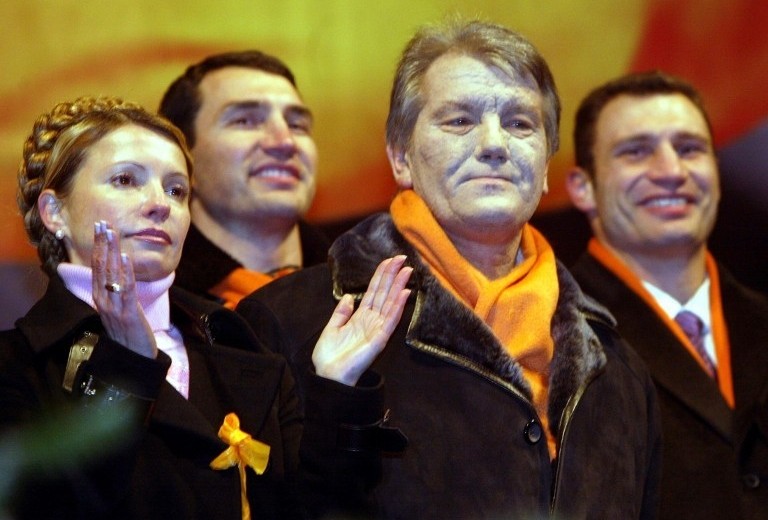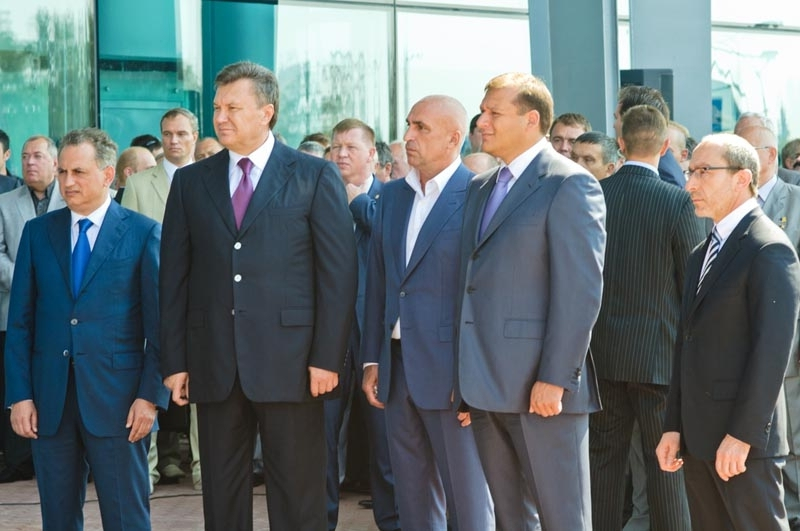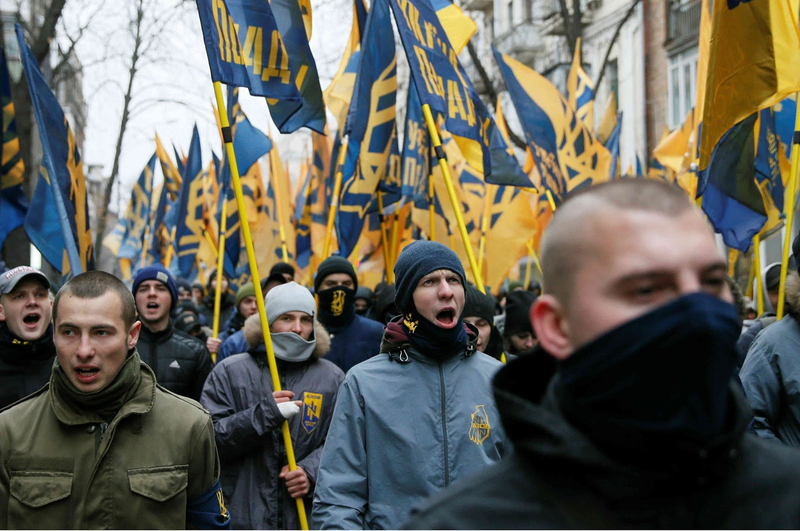While in Moscow it is commonly accepted that Ukraine's separation from Russia was caused by a plot, Dmitri Trenin argues that it was the result of a natural process of nation building. It helps the development of Russia's own statehood, Russia's orientation towards the future instead of the past, he states on the website Russia in Global Affairs.
The Ukrainian crisis resulted in a political confrontation between Russia and the U.S. and Russia’s alienation from EU countries. It brought an end to repeated attempts by the Russian Federation to 'plug itself into' the Euro-Atlantic community and to become part of the 'expanded West'. The consequences of this crisis are of fundamental significance for Russia itself, its national self-consciousness and its geographical self-determination.
The events in Ukraine have concluded the post-imperial period in Russian history, when Russia pinned its hopes on deep reintegration of the former Soviet republics. Those events have also opened up an era where the Russian Federation is establishing itself as a separate and self-sufficient state, seeing the other post-Soviet countries as close neighbors, but not as parts of a unified geopolitical space headed by Moscow.
Lessons learned from Ukraine
- Ukraine’s separation from Russia was not caused by an internal conspiracy or external plot but is the result of the political process of forming a Ukrainian nation state. This process need not have taken the form of violent actions, but in any event it would have led to Ukraine’s separation from Russia. Minsk’s slow but real drift away from Moscow illustrates a 'soft' departure of part of the historical core from Russia.
- The establishment of independent Ukrainian and Belarusian statehood facilitates the development of Russia’s own national project, which is oriented towards the future, rather than towards the restoration of the past. Its key foreign policy feature is real sovereignty and the freedom of geopolitical maneuvering. At the beginning of the 21st century, the Russian Federation is restructuring itself within the emerging Greater Eurasia, making use of its unique geopolitical situation for the benefit of its own development.
- The 'Russian world' concept has the right to exist, but for the most part in the sphere of language, culture, religion, and other humanitarian issues. Using this concept to justify concrete geopolitical steps, provide cover for interference in the internal affairs of other states and generally as a foreign policy instrument compromises Russia’s policy and is detrimental to the concept itself.
- The policy of resisting NATO’s eastward expansion requires a serious and careful reevaluation. In those cases where it has been successful, first and foremost in Ukraine, the result whereby a large hostile state appears capable of creating an army as well trained as that of Russia can hardly be regarded as satisfactory. The problem was not, of course, that the Russian Federation resisted attempts to incorporate Ukraine into NATO, but that it always sought to oppose the West, first and foremost the U.S., while relations with Ukraine were reduced to a minimum.
- The main lesson in Ukraine for Russia, therefore, is the need to attentively observe, deeply analyze and try and understand Ukraine which, even if it is oriented towards the West, will be an important neighbor for Russia. As the conflict between Ukraine and Russia is far from being resolved, and Crimea could still become an Eastern European variant of Alsace-Lorraine, the main task of Russia’s Ukraine policy in the foreseeable future will be the prevention of war between the two countries and the gradual development of dialogue. Amidst talk of brotherhood and unity, Russia has paid a high price for ignoring the real Ukraine. It is time to learn to take Ukraine seriously.
'Ukraine is not Russia'
The Ukrainian crisis has been a severe test for Russian foreign policy. A key lesson for Russia in the crisis lies in the need to take Ukraine seriously and comprehensively, and to study it soberly, without emotions. Up until now, Russia’s Ukraine policy has usually focused on two or three pressing issues: at first on the removal of Soviet nuclear weapons from Ukraine and the division of the Soviet Black Sea Fleet; then on the prices for the gas supplied from Russia and the conditions for its transit across the Ukrainian territory to EU countries. The Ukrainian issue, figuratively speaking, was narrowed down to the size of rockets, ships and the notorious 'gas pipeline', while the problems in relations were set aside.
Despite the 'Big Agreement' of 1997, confirming Ukraine’s independence within the borders of the Ukrainian Soviet Socialist Republic, Moscow, while formally recognizing Ukraine as a separate state, did not see it as a 'foreign' state, but tied to Russia by a multitude of seemingly unbreakable bonds. In fact, Ukraine was seen by many as part of Russia’s historical core, and its independence as a transitional stage. Addressing Russian readers and polemicizing on such views, Ukraine’s second President Leonid Kuchma titled his book Ukraine Is Not Russia, with the negative 'not' emphasized in red on the book’s cover. Not everyone, however, noticed this warning.
 In 2004 Viktor Yushchenko won the elections after massive street protests, the Orange Revolution. Photo copyright free
In 2004 Viktor Yushchenko won the elections after massive street protests, the Orange Revolution. Photo copyright free
The 'Orange Revolution' of 2004-2005, Russian policy’s first major failure in Ukraine, was seen by Moscow as being almost exclusively the result of external interference with far-reaching geopolitical goals. It was believed that the American 'producers' of the Ukrainian and other 'color' revolutions had made use of the contradictions within the Ukrainian leadership, bribing or recruiting a certain part of it, exploited the population’s discontent with the social-economic situation in the country and, eventually, sent active youth nurtured on Western grants into battle. In this way, the events in Kiev were presented as an attempt by the U.S to 'squeeze' Russia out of its key position in the post-Soviet space, and to test the scenario for a similar 'street' uprising in Moscow.
The squabbles that quickly started among Kiev’s victorious 'orange' activists blunted these fears, returning complacency to many people in Moscow. The alarm bells, however, were rung when, unexpectedly, the Kiev authorities asked to be provided with a plan for Ukraine’s preparation for NATO membership, and Washington immediately gave its support. Russian President Vladimir Putin took an unprecedented step by traveling to Bucharest for the April 2008 NATO summit in an attempt to convince the alliance’s leaders of possible troubles in Ukraine and a schism that would split up the country if Kiev made moves towards NATO.
Red line
Essentially, Moscow drew a 'red line', warning the West of the danger of a conflict with Russia and warning Kiev that it might stop respecting the territorial integrity of Ukraine if the country split on the issue of joining the North Atlantic Alliance. The war that began in August 2008 in South Ossetia confirmed the seriousness of Russia’s intentions. Consequently, the issue of Ukraine’s and Georgia’s membership in NATO was 'put on hold'.
It seemed that Moscow’s firmness with regard to the U.S. and pragmatic approach to the Ukrainian leadership were paying off. The election of Victor Yanukovich Ukrainian president in 2010 was interpreted as revenge for the defeat of five years earlier, a correction of Kiev’s political 'zigzag' and a down-payment on the future integration of Ukraine into a unified economic, political and strategic space shared with Russia. Ukraine occupied a key position in the Eurasian Union concept that became the foundation of the foreign policy section in Vladimir Putin’s presidential program in 2011. The success of the entire Eurasian integration project, in essence, was dependent on Kiev’s economic and political orientation.
It could’ve been worse…
Russia’s Ukraine policy just before the 2013-2014 crisis had often been judged as a failure. Indeed, Russia had failed to prevent the overthrow of Victor Yanukovich by the Kiev Maidan and proved unable to provide, at the very least, a political counterweight to the new 'Maidan' authorities in the form of the predominantly Russian-speaking south-east of Ukraine. Concentrating exclusively on relations with the Ukrainian leadership and replacing politics with political technologies, Moscow did almost nothing to strengthen the political forces in Ukraine that were friendly to Russia, with the important exception of Crimea.
 Pro-Russian president Yanukovich (second to the left) became president in 2010, seen by Moscow as a revenge for the Orange Revolution. Photo copyright free
Pro-Russian president Yanukovich (second to the left) became president in 2010, seen by Moscow as a revenge for the Orange Revolution. Photo copyright free
Nevertheless, the cost of the failure of Russia’s Ukraine policy turned out to be lower than the completely unaffordable cost its success would have incurred. Let’s imagine what would have happened if president Yanukovich in 2013 had unambiguously taken Russia’s side and had agreed to Ukraine’s full participation in the Eurasian Union project. Russia would have received a country with a population of 45 million that it would have had to support, first and foremost financially, for a prolonged and indefinite period; Kiev would have received an opportunity to expensively sell its agreement to any decision taken within the framework of the Union; and, at the end of the day, despite all the support provided, Russia would have had to — most likely again through conflict — let Ukraine go. As Leonid Kuchma wrote, after all, 'Ukraine is not Russia'.
Let’s also imagine that Victor Yanukovich at the beginning of 2014 did what many in Moscow were expecting of him and broke up Maidan protests and introduced a state of emergency. The result would still have been a civil war in Ukraine. Rather than in the east, in Donbass, it would have happened in the west of the country, where a new Western Ukrainian people’s republic would have emerged, complete with its own guerrillas, and Yanukovich would have been forced to begin his own anti-terrorist operation in order to suppress them. It’s unlikely that he would have been successful. In his day, not even Stalin could stamp out the Galicia partisan resistance. Poland and NATO would not have openly interfered, but they would have aided the insurgents and certainly not just morally.
Ukraine, in the meantime, would have been subject to sanctions from the West, and Russia would have had to compensate for the losses thus incurred. Under this scenario, Russia itself would also have been subjected to sanctions, and it is likely that they would have been harsher than they are at present — 'for the support of a repressive puppet regime in Kiev'. To reinforce this regime, Russia would have had to send security specialists to Ukraine, including Special Forces personnel. This would have provoked a great deal of discontent and mass resistance not only in Galicia but also in Volyn. As a result, Russia would have found itself caught in a trap that it could not get out of without facing catastrophic consequences. Despite all the complications, the current situation is far more favorable for Russia.
The formation of the Russian political nation
The main reason for the fiasco of Russia’s policy in Ukraine is the failure to face a fact that is unpleasant for many Russians: almost the entire Ukrainian elite — political, economic, cultural in the west, south-east and Kiev — is imbued with the spirit of 'nativism' and the dream about the realization of an 'independent Ukraine' political project different and separate from the Russian political project. In practice, such a project cannot be implemented merely through economic integration, let alone fully-fledged integration of the two countries. Similarly, it is absolutely clear that the strong and attractive force of Russia, its language and culture impede the formation of a Ukrainian-speaking political nation. The Ukrainian political project, in principle, can only be successful if Ukraine is isolated from Russia to the maximum extent possible.
No surprise that in Russia Ukrainian nationalism is viewed as a deeply negative and dangerous phenomenon. In Russia itself, the prevailing view is that 'Russians and Ukrainians are essentially one people' and that Ukrainian nationalists seeking independence are essentially dissenters attacking the unity of a 'brother nation'. From this point of view, the Ukrainian nationalists are not just the enemy of the Russians, they are also the enemy of the Ukrainians.
The problem, however, is that the Ukrainian leadership, even before the 2013-2014 crisis, was gravitating towards nationalists, seeing them as 'true' Ukrainians, rather than 'Malorossians' (Little Russians) — younger brothers of the Russians. Following the Kiev Maidan, Crimea and Donbass, this tendency has become dominant. A continually deepening division between Ukraine and Russia has also become reality. The Ukrainian political nation is forming on anti-Russian foundations. Nationalists in Kiev demand investigation in killings Maidan. Photo copyright free
Nationalists in Kiev demand investigation in killings Maidan. Photo copyright free
In Russia, this has not been fully realized yet. The emphasis to this day is placed on what is shared, on what brings the Eastern Slavic peoples together and the factor of common faith and common history, with far less attention being paid to their differences. As a result, those differences in public consciousness remain on a folklore and regional level. In the meantime, the Russian authorities are reviving the concept of a unified Orthodox Russian people that was officially adopted by the Russian Empire at the end of the 19th and the beginning of the 20th centuries.
Today, the talk is of a Russian world as a distinct civilizational community. This approach, however, can partially be justified only with regard to culture, rather than to economics or politics. The use of the Russian world slogans in 2014 to support the political unity of Russia and Ukraine quickly compromised the idea of community itself not only in Ukraine but also in Belarus.
Meanwhile, the establishment of a self-sufficient Ukraine and Belarus that are independent of the Russian Federation is a natural process that is predetermined by the logic of the development of the neighboring peoples, and this is something Russia should understand and accept as a fact rather than attempting to 'regain' Ukraine or retain Belarus within its orbit at any cost. Whatever one might think of the 'Ukraine is Europe' slogan, it is clear that the vector of Ukraine’s ambitions is directed towards the European Union. We can also maintain with a fair degree of confidence that the Belarusians as well associate their country with Europe and do not see Belarus as a mere extension of the Russian Federation. President Alexander Lukashenko is gradually constructing an independent Belarusian state that must under no circumstances fully integrate with Russia.
There is a clear geopolitical demarcation here. The process of self-determination of the Russian nation has not yet been completed, but Russia, unlike its close neighbors, is seeking to establish itself as an independent superpower that is not associated either with the European Union or other power centers such as China. Russia sees itself as a global force with its key zone of activity being 'Greater Eurasia' — the entire vast continent from the Atlantic to the Pacific and from the Arctic to the Indian Ocean. Russia, in this context, is not Europe or Asia, it is just Russia in its own right. To paraphrase Leonid Kuchma, 'Russia is not Ukraine'.
We could go further and propose a thesis whereby an independent Ukrainian state and the Ukrainian political nation can benefit the Russian Federation by facilitating Russia’s transfer from the post-imperial condition in which the country found itself after 1991 and creates better conditions for the formation of its own political nation. This process accelerated after 2014, and we can speak not so much about the incorporation of Crimea as about the separation of Ukraine. The official version of Russian history already regards Chersonese in Crimea as the 'main' site of the baptism of Rus, and Novgorod as the cradle of the Russian statehood. There is no doubt that with time, Kiev, 'the mother of Russian cities', will come to occupy a position in the Russian public consciousness similar to that of Constantinople (known among Slavs as Tsargrad), which always enchanted the Russian elites for centuries from Catherine the Great to Nicholas II.
This is a slightly abridged version of Trenins article at the Russian website Russia in Global Affairs.
